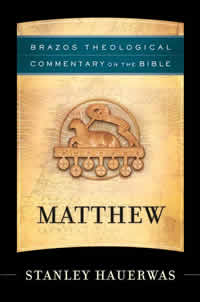Book Notes
 Stanley Hauerwas, Matthew; Brazos Theological Commentary on the Bible (Grand Rapids: Brazos Press, 2007), 267pp.
Stanley Hauerwas, Matthew; Brazos Theological Commentary on the Bible (Grand Rapids: Brazos Press, 2007), 267pp.
As I write there are now four volumes published in Brazos's projected forty-volume series of theological commentaries on the Bible. Jaroslav Pelikan led the series with a masterful study of the book of Acts (2005), Peter Leithart studied 1-2 Kings (2006), Matthew Levering wrote on Ezra and Nehemiah (2007), and in the present volume Stanley Hauerwas of Duke University tackles the gospel of Matthew. My own experience of reading Bible commentaries has often been frustrating; their linguistic dissection of verb tenses and technical comparisons of what other scholars have written has generally left me spiritually hungry. The Brazos series moves to theological reflection, and I have been very grateful for the volumes by Pelikan and Hauerwas that I've read.
Matthew's gospel, Hauerwas reminds us, is not intended to provide mere theological information (although it does do that). Rather, it's a manual to train and transform us into disciples of Jesus, for "Jesus the Son of God is what Matthew is all about." In contrast to the many ways that we sentimentalize the gospel, the kingdom that Jesus announced is nothing less than a radically subversive and alternative way of life. The Jesus way unmasks our own deep anxieties, our denials of our dependency, the "legitimating stories" of our modern world, and our doomed attempts to secure our own (illusory) salvation on our own terms by work, politics, money, sex, power, reputation, etc. "There is a kind of madness," says Hauerwas, "with being a disciple of Jesus."
Hauerwas takes a simple approach to organization, devoting one chapter to each chapter of Matthew. Readers who are familiar with his many other works will not be surprised to find heavy doses of Augustine, Barth, Bonhoeffer, and Yoder. Hauerwas is at his prophetic best in pointing us to the disruption and offense provoked by the Gospel. On the third page of his book he observes that "after Jesus there is no 'normal,' or, put differently, after Jesus we are able to live 'normally' only because of his extraordinary work." And then on the next-to-the last page: "The problem, after all, is not belief in the resurrection, but whether we live lives that would make sense if in fact Jesus has not been raised from the dead." The way of discipleship, then, is difficult, but it's not dismal. Rather, it's the only true way of genuine human joy.


